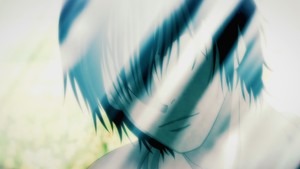The Night Beyond the Tricornered Window
Episode 5
by Rebecca Silverman,
How would you rate episode 5 of
The Night Beyond the Tricornered Window ?
Community score: 4.4

Although the history of Mikado's parents could easily have been given its own episode, the decision to combine it with snippets of other people talking about relationships was ultimately a good one. That's because the core of his parents' relationship – and his father's eventual leaving – are tied up in ideas of finding rest and safety with other people. Mikado, we now know for a fact, inherited his “sight” (perhaps I should just use the Spiritualist term Sight) from his father, and it was his mother who offered the man the only relief from it he'd ever known. Something about her seems to purify the space around her, or any space she claims as “hers,” and that (and hopefully her personality) allows him the space to fall in love with her. All is well until he realizes that his son has the same Sight he does and that his wife is only so powerful – one of the Sighted men in her life will have to go if the other is to survive with his sanity intact.
That Mikado's dad decides that he'll be the one to leave, given what's revealed at the end of the episode, is frankly amazing. It's the ultimate selfless act for him, because he knows that once he's no longer in his wife's sphere of influence he'll go back to the way he was before, only it'll be worse because he'll no longer have the hope that she gave him, nor the hope that she'll ever be able to save him again. While that last may not be strictly true, it certainly fits with the desperate, desolate outlook that he has, one that caused him to curse her to forget both his name and his face. He's basically cut her off with no chance of reuniting in an effort to save his child.
Is that cutting off his nose to spite his face, as my grandmother used to say? Maybe. It does seem a little excessive, and it certainly discounts the possibility that Mikado will ever meet a person besides his mother who can make him feel free and safe. (In fact, he may have met two!) But it is in line with the person we see that he's become – a man who wears his bangs long enough to interfere with his eyesight and doesn't tell anyone his name, because names have power. A man who, in fact, seems to have no problem buying Erika Hiura from her father to have access to her powers, which is drastically different from the one who gave up his safety so that his son could have it.
The contrast between the man we now know and his son is an interesting one, with Hiyakawa and Hiura falling somewhere in between the two. Mikado, now that he's met Hiyakawa and Maeda, isn't interested in half-measures anymore; he knows now that there are things that he can use his Sight for and ways to make things different for himself, and he's ready to learn them. To his mind, that means creating an equal partnership with Hiyakawa, and his contemplation of the “rope” that ties them together working both ways is a mark of how far he's come in his desire to make things work, to say nothing of the need to understand what Hiyakawa's deal is. Maeda is similar in that he doesn't just force Hiyakawa to stop what he's doing to the ghost that confronts him; instead, he shows him that there's another way to handle the situation. He's not keen on being superior; he wants to work with Hiyakawa, if only for Mikado's sake, to show him that there's more than one method to use. That Hiyakawa doesn't quite understand any of what's going on drives home his oddness and difficulties with human interaction. Finding out more about why he is that way feels like the next big step the story needs to take.
In another world, Mikado and Hiura could have been like Hiyakawa. That they aren't is due to the people they grew up with – Mikado's mom and Hiura's bodyguard Sakaki. What does that tell us about how Hiyakawa was raised…?
Rating:
The Night Beyond the Tricornered Window is currently streaming on Crunchyroll.
discuss this in the forum (37 posts) |
back to The Night Beyond the Tricornered Window
Episode Review homepage / archives